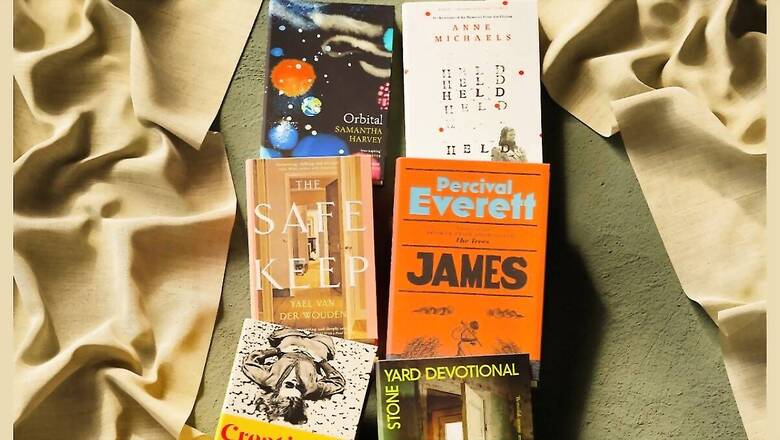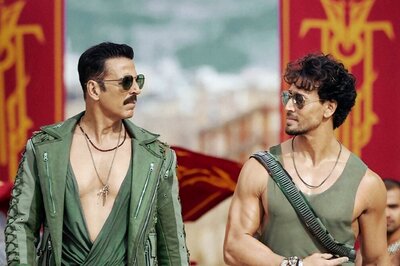
views
On September 16, the jury for the Booker Prize 2024 shortlisted six books from 156 works published between 1 October 2023 and 30 September 2024, submitted by publishers for the prize. The winner, whose career is often transformed by this prestigious recognition, will receive a £50,000 cash prize and a trophy named ‘Iris’. The announcement will be made at a ceremony held at Old Billingsgate in London on the evening of November 12, 2024.
Decoding Booker
The Booker Prize is one of the most coveted literary awards, presented annually to a novel written in English and published in Britain or Ireland. Established in 1969, the prize was originally limited to writers from Britain, Ireland, the Commonwealth, and Zimbabwe, but in 2014, its eligibility was expanded to include any English-language work. Last year’s winner was Prophet Song, a novel by Paul Lynch set in a near-future Ireland ravaged by civil war, while the 2022 prize went to Sri Lankan author Shehan Karunatilaka for his novel The Seven Moons of Maali Almeida.
The Jury
The jury for the 2024 Booker Prize is an eclectic mix, chaired by Edmund de Waal, the contemporary British ceramicist, artist, and author, who once famously said, “My fantasy is that people will look at my pots and think: rigorous, yet quite passionate and humane.” The other jury members are: Chinese-American Yiyun Li, the renowned writer and creative writing professor; Justine Jordan, the celebrated fiction editor of the British daily The Guardian; Sara Collins, the iconoclastic barrister-turned-award-winning author, who, after working as a lawyer for seventeen years, decided that being a writer was her true calling; and Nitin Sawhney CBE, the British-Indian musician, producer, and composer.
Timely and Timeless
During the shortlisting process, the jury first selected a longlist of 13 books in July, which it described as “timely and timeless,” navigating themes of belonging, displacement, and return. While announcing the longlist, the jury’s chairperson, Edmund de Waal, remarked that “the precarity of lives” is a theme that “runs through our longlist like quicksilver,” but emphasised that the selected titles are “not books about issues.” Instead, he said, they are “works of fiction that inhabit ideas by making us care deeply about people and their predicaments.”
Among the longlist, dubbed the “Booker dozen,” three are debut novels, while half of the longlist consists of works by established authors who have been previously nominated for the Booker Prize. The list also includes the third-time nominee, Pulitzer Prize winner Richard Powers, for his latest work Playground, which tackles significant issues such as climate change and the threat of AI. Six novels by U.S. authors and two by British authors made up the cohort of 13 titles on the longlist.
Uniquely Unique
The Booker Prize shortlist was announced on Monday, September 16, 2024. The nominated titles include Rachel Kushner’s Creation Lake, Percival Everett’s James, Yael van der Wouden’s The Safekeep, Samantha Harvey’s Orbital, Anne Michaels’ Held, and Charlotte Wood’s Stone Yard Devotional.
The most striking aspect of this year’s shortlist is that, for the first time in the prize’s 55-year history, five of the six nominated titles are by female authors. Jury member Sara Collins described this as “a gratifying, thrilling moment”—particularly given that last year’s shortlist featured more novels by men named Paul (three) than by women (two).
In terms of territorial representation, this year’s shortlist includes authors from five countries, including the first Dutch writer to be shortlisted, the first Australian in 10 years, as well as British, Canadian, and American authors. Additionally, two of the shortlisted authors have been nominated previously.
Short List in Brief
The Booker Prize website succinctly describes the plots of the six shortlisted books: “The list features stories that transport readers around the world and beyond Earth’s atmosphere—from the battlefields of the First World War to a spiritual retreat in rural Australia; from America’s Deep South in the 19th century to a remote Dutch house in the 1960s; from the International Space Station to a cave network beneath the French countryside. Among other themes, the shortlisted books explore the gravitational pull of home and family, the contested nature of truth and history, and the extent to which we reveal our true selves to others.”
Here is a brief overview of the six artistic creations in the shortlist:
1. Creation Lake by Rachel Kushner: This riveting yet utterly flinty and hard-nosed page-turner features a mystery at its core—both the mystery of human origins and individual identity. Kushner poses timeless and profound questions: Where do we come from? What is an individual really made of? What do people encounter in their stark and solitary 4 a.m. moments? What lies within them?
As a philosophical and political novel of ideas wrapped in a spy caper, Creation Lake tells the story of an American who arrives in rural France to disrupt a commune of eco-activists. Despite her ultra-cool confidence, her plans go awry in this thrilling spy narrative, which includes radical leftists, utopianists, a reclusive guru obsessed with Neanderthals, and the shadowy forces of ruthless capitalism. Throughout, Kushner examines how the individual interacts with and disrupts ideologies. That may sound dry, but her prose is so thrilling and engaging, her narrator, the audacious character of “Sadie Smith,” so jaunty, irresistible, and self-willed, and her world-building so lush, that it’s anything but.
2. James by Percival Everett: James offers page-turning excitement along with an off-kilter philosophical picaresque. The Guardian remarks that with more than four decades of writing behind him, “it feels like a book he was born to write.” In James, Everett retools, reworks, and reimagines Mark Twain’s Adventures of Huckleberry Finn, and it would not be an overstatement to say that Everett supplants Finn’s creation.
Everett tells the story in James from the perspective of the enslaved Jim, who, in the original, is portrayed as both a lesser creature and a learning opportunity for Huck to demonstrate his own humanity. Indubitably, the book is ferocious, yet it remains ferociously readable.
The central protagonist, Jim, instantly evokes empathy in readers as Everett skillfully immerses them in Jim’s internal struggle, his yearning for freedom, and his love for his family. Readers viscerally feel his pain, anger, and determination, making his journey deeply resonant. Huck also emerges as a powerful character in his own right as Everett weaves a tapestry of the complex and evolving relationship between Jim and the young Huck, who form a deep emotional bond as Huck gradually awakens to the intense desire to stand by Jim.
While the powerful storyline in James deals with the horrors of slavery, it simultaneously examines universal themes of identity, freedom, and justice. Everett challenges readers to wake up and question, as well as to reflect on, the nature of morality, the corrupting influence of power, and the indomitable resilience of the human spirit.
3. Held by Anne Michaels: By Canadian novelist and poet, Anne Michaels it is best described by the Booker judges as “a kaleidoscopic novel about war, trauma, science, faith, and, above all, love and human connection. Reading it seems to alter your state of mind.”
Michaels has her own story to tell about Held. She reflects that day after day, while writing this book, she asked herself: in these urgent times, what voice might be small enough to be heard? What do we need now? We measure history by events and actions, but Held asserts a different measure for history: the real and powerful effects of our inner lives—what we believe, what we value, what we love, and what we aspire to. In her own words, Held explores our conflation of science with technology, the surrender of our ancient relationship with what can’t be seen, and asks why we have so insistently foreclosed on what we have always known—that there is crucial meaning and value in what, necessarily, cannot be proven. The author reiterates that Held asks, in different ways, what forces bring us to the present moment. These forces range from particle physics to evolution, revolution, hauntings, hope, gestures, errors, empathy, and desire—this is Held’s investigation.
Starting with a wounded soldier on a French battlefield, this powerful and lyrical kaleidoscope of a novel is created from the scattered images and memories of four generations of a family across diverse lived experiences. It presents a complex yet poetic narrative of this intergenerational relationship—the book opens with John, the recovering soldier turned photographer, and the artist Helena, as they learn to support each other. As we move through multiple generations, we gravitate toward the interstices between parent and child. Helena and her daughter Anna provide an arc of tenderness throughout the novel.
Held is a deeply moving poetic novel that tenderly asks the existential question: “Who can say what happens when we are remembered?”
4. Stone Yard Devotional by Charlotte Wood: This introspective piece by the Australian writer, who has authored seven novels and three works of non-fiction, is a quiet and warm-hearted read. It invites readers not to rush ahead in search of a plot, but to reflect on the deeper issues that confront us all at one time or another.
The title of the book itself is thought-provoking: “Stone Yard,” set against the gentle inwardness of “devotional,” creates a powerful inner intensity. It is a deeply moving novel about forgiveness, grief, and what it means to be ‘good.’ The story follows a middle-aged woman, burnt out and in need of retreat, as she leaves the bustling life of Sydney to return to the place where she grew up, seeking refuge in a small religious community hidden away on the stark plains of New South Wales. Although she does not believe in God or understand what prayer is, she finds herself living a strange, reclusive existence almost by accident.
However, her secluded life is interrupted by three significant visitations. First comes a terrible mouse plague, each day signalling a new battle against the rising infestation. Next is the return of the skeletal remains of a sister who disappeared decades ago, presumed murdered. Finally, a troubling visitor plunges the narrator further back into her past.
With each of these disturbing visitations, the woman confronts deep questions: Can a person be truly good? What is forgiveness? Is the loss of hope a moral failure? And can the process of grief ever really be finished?
It is quite an introspective, meditative, and deeply moving novel!
5. The Safekeep by Yael Van Der Wouden: This debut novel is mesmerising, thrilling, and brave; it tells an erotically charged story about a woman who unexpectedly falls for her brother’s girlfriend. Set fifteen years after the end of the Second World War in the Netherlands, the narrative centres on Isabel—a fantastically sour and spiky character—who lives alone in the family house after her mother’s death, clinging to routine and disapproving of her brothers.
One brother is gay, while the other is an unreliable romantic who sends his girlfriend to stay. The tightly controlled narrative breaks open into a tale of exotic erotic awakening, culminating in an almighty twist. Through her storytelling power and the way, she controls the narrative, Wouden crafts a page-turner that explores themes of trauma and repression.
What a queer love story it is! The unfolding relationship between the two women at the heart of the novel makes for obsessive reading. The tale is told tenderly and in an extraordinary way. We first meet Isabel, who is deeply distrustful of strangers and burdened with the task of keeping the family inheritance safe. Then there’s Eva, unsettling and seemingly unmoored from domestic anxiety. As they are pulled into each other’s orbit, we start to care about both characters.
The Safekeep is undoubtedly a compelling story of obsession and secrets, exploring the narratives we keep hidden from ourselves as children and the stories we tell ourselves about our own concealed desires.
6. Orbital by Samantha Harvey: This new-age narrative, in the author’s own words, is a “space pastoral” that has been in the making for twenty-five years. The Booker judges describe it as “Six astronauts observe Earth’s splendour while navigating bereavement, loneliness, and mission fatigue. Compact yet beautifully expansive, this is a love letter to our planet.”
This theme couldn’t be more sobering, timely, or urgent. The book is slim yet beautifully crafted, tightly constructed while breaking free of the constraints of time. It is both prose and poetry par excellence, scientifically precise yet transcendent at the same time. A compulsive read, there is never a dull moment in the book.
The narrative carries a powerful message centred around the vision of Planet Earth as borderless and interlinked. Harvey strongly advocates for the futility of territorial conflicts and the need for cooperation and respect for our shared humanity.
The author is Multidisciplinary Thought Leader with Action Bias, India Based International Impact Consultant, and keen watcher of changing national and international scenarios. He also is a voracious reader of books and an independent book reviewer. He works as President Advisory Services of Consulting Company BARSYL. Views expressed in the above piece are personal and solely those of the author. They do not necessarily reflect News18’s views.



















Comments
0 comment